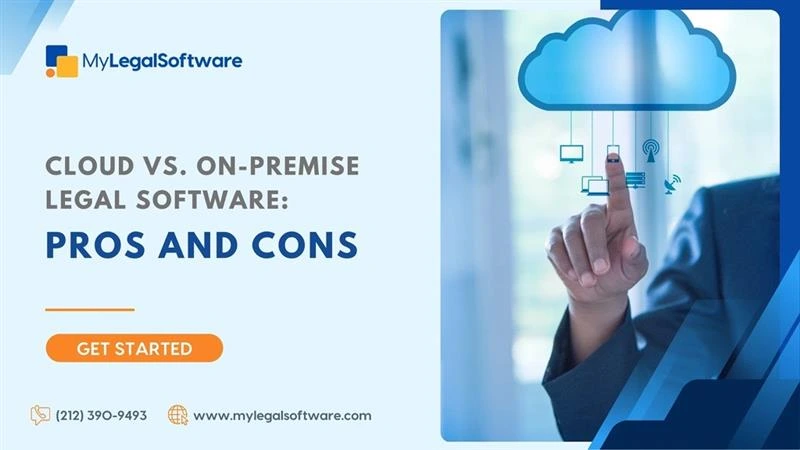Cloud vs. On-Premise Legal Software: Pros and Cons
Choosing the right legal software is no small task, especially when it comes to managing cases and client information. With so many options on the market, two of the most popular choices that law firms face are cloud legal software and on-premise solutions. Each comes with its own benefits and challenges, and depending on your firm’s needs, one might be a better fit than the other.
In this blog, we’ll break down the key differences between cloud-based and on-premise legal software. We’ll look at everything from security and costs to flexibility and accessibility—so by the end, you’ll have a clearer picture of which one might work best for your practice.
What is Cloud Legal Software?
Let’s start with cloud legal software. Simply put, this is software that’s hosted on the cloud (i.e., the internet). Instead of being installed on your local servers or desktops, you access it through your web browser. This means you don’t need to worry about maintaining servers or handling software updates yourself—your provider takes care of that for you.
Cloud software is usually subscription-based, meaning you pay for access on a regular basis—monthly, quarterly, or annually. Because it’s cloud-based, you can use it from virtually anywhere, as long as you’ve got an internet connection.
What is On-Premise Legal Software? | Cloud vs On-Premise Legal Software
Now let’s talk about on-premise solutions. With these, the software is installed directly on servers and computers within your firm’s office. You have full control over the software and the data it stores, but with that control comes responsibility.
On-premise software typically requires an upfront investment in both the software and the hardware to run it. Plus, you’re responsible for all updates, maintenance, and security—though this can be handled by an in-house IT team or an outsourced provider.
Cloud Legal Software: The Pros
- Access From Anywhere
One of the most compelling reasons to choose cloud-based legal software is its accessibility. Whether you’re in the office, working remotely, or traveling, you can access your case files and documents from virtually anywhere. For law firms that value flexibility and mobility, this is a huge plus.
- Automatic Updates
With cloud legal software, you don’t have to worry about manually updating your system. Your provider takes care of it automatically, which means you’re always using the latest version with the most recent features and security updates. This is one less thing to stress about!
- Cost-Effective
Cloud software can be more affordable, especially if you’re a small to mid-sized firm. Instead of a large upfront cost, cloud-based solutions usually operate on a subscription model that covers everything—maintenance, support, and updates. You don’t need to worry about paying for extra hardware or IT support either.
- Scalability
As your firm grows, cloud software grows with you. Need to add more users, features, or storage? It’s simple to scale up. Cloud solutions are designed to be flexible and can adapt to your changing needs without the hassle of upgrading your entire infrastructure.
- Collaboration Made Easy
With cloud software, collaboration is a breeze. Team members can access, edit, and share case files in real-time, no matter where they are. This enhances productivity, reduces miscommunication, and makes working together much easier.
- Security
While security concerns can sometimes make people wary of cloud software, most providers offer top-notch encryption, multi-factor authentication, and automatic backups. In fact, some would argue that cloud-based systems can be more secure than on-premise solutions, especially if you don’t have a dedicated IT team in-house.
On-Premise Legal Software: The Pros
On-premise legal software still has its loyal followers, and for good reason. Here’s why some law firms prefer this more traditional approach.
- Full Control Over Your Data
One of the major selling points of on-premise legal software is control. Since your data is stored locally, you have complete control over how it’s stored, secured, and backed up. For firms that handle highly sensitive information and prefer to manage security in-house, this can be a huge advantage.
- Customization and Integration
On-premise software tends to offer more customization options. If your firm has unique processes or workflows, an on-premise solution can often be tailored to meet those needs. Plus, it can integrate more easily with other systems you may already be using, like billing or document management software.
- Security (But More Responsibility)
With on-premise solutions, you have direct control over security measures. If you have an in-house IT team, they can manage firewalls, antivirus software, and other security protocols. But keep in mind, you’re also responsible for ensuring your system stays secure, and that means regular maintenance and vigilance.
Cloud vs On-Premise Legal Software: The Cons
Of course, no solution is perfect. Here’s a quick look at the potential downsides of both cloud and on-premise legal software.
Cons of Cloud Legal Software
- Security Concerns
While cloud providers do take extensive precautions to protect your data, some firms are still nervous about storing sensitive client information online. If you’re in a jurisdiction with specific data protection laws, or you simply don’t feel comfortable with external providers handling your data, cloud software might not be the best option for you.
- Internet Dependency
You’ll need a reliable internet connection to access cloud software. If your connection goes down or becomes unstable, so does your access to the system. This can be frustrating, especially if you rely heavily on the software for managing cases and communicating with clients.
- Ongoing Subscription Costs
Cloud-based solutions are generally more affordable upfront, but the ongoing subscription costs can add up over time. If you’re a larger firm or you need many features, you may find that the total cost of ownership ends up being higher than you initially anticipated.
Cons of On-Premise Legal Software
- High Initial Investment
The upfront costs for on-premise software can be significant. You’ll need to purchase both the software and the hardware to run it, and depending on your setup, you may need to hire an IT team or outsource maintenance. These costs can be a barrier, especially for smaller firms or those just starting out.
- Maintenance and Updates
With on-premise software, you’re responsible for regular maintenance, updates, and security patches. If you don’t have an IT team, you might have to rely on third-party vendors, which can get expensive and time-consuming.
- Limited Access
On-premise software is tied to your office network, which means you can’t easily access it from other locations. Sure, you can set up remote access, but that can add complexity and cost to the setup.
Cost Analysis: Cloud vs. On-Premise Legal Software
Let’s talk numbers. Cloud legal software generally has lower upfront costs and a predictable subscription fee. This can be great for small and mid-sized firms that don’t want to invest in expensive hardware and don’t have the budget for an in-house IT team.
On-premise solutions, on the other hand, often come with higher initial costs. You’ll need to purchase software, servers, and other equipment, and you’ll have to pay for maintenance and updates. However, once you’ve made that initial investment, you don’t have recurring subscription fees. For large firms with complex needs, an on-premise solution might make more sense in the long run.
Conclusion – Cloud vs On-Premise Legal Software
So, what’s the verdict? Cloud legal software vs on-premise solutions? The right choice really depends on your firm’s unique needs. If flexibility, lower upfront costs, and easy access are important to you, cloud software is a solid bet. But if you need more control over your data, customizability, and already have an IT team in place, on-premise might be the better fit.
At My Legal Software, we understand the importance of security, that’s why we offer top-notch cloud-based solutions designed to keep your data safe while enabling easy access and collaboration. If you’re ready to streamline your practice with the best tools available, don’t hesitate to get in touch with us today!
Want to learn about the top features to look for in legal management software? Go here.
Frequently Asked Questions – Cloud vs On-Premise Legal Software
- What’s the main difference between cloud legal software and on-premise solutions?
Cloud legal software is hosted on the internet and accessible remotely, while on-premise solutions are installed on local servers and computers. Cloud software offers flexibility and lower upfront costs, while on-premise gives you more control and customization options.
- Is cloud legal software safe?
Yes, most cloud providers use top-tier security measures like encryption, multi-factor authentication, and automatic backups. However, it’s important to follow best practices like strong password management to ensure your data remains secure.
- What are the typical costs of cloud vs on-premise legal software?
Cloud software usually has lower initial costs, with a subscription fee covering updates and support. On-premise software requires a significant upfront investment for software and hardware, along with ongoing maintenance costs. However, cloud solutions can be more cost-effective over time, especially for smaller firms.








